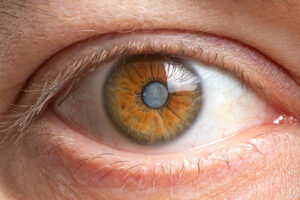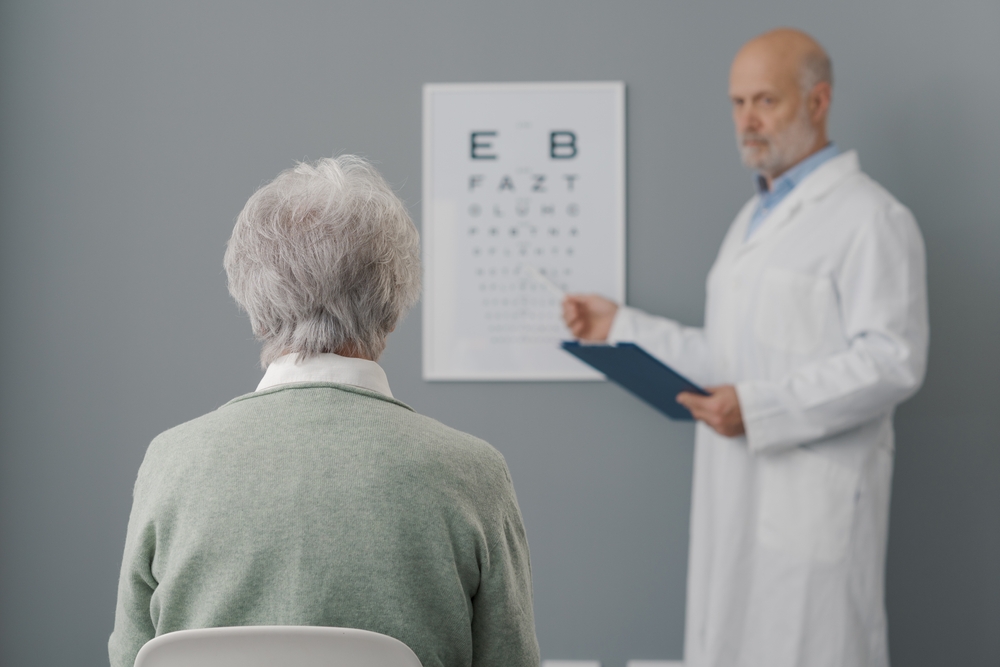How Does My Eye Doctor In Columbus Check for Cataracts?
Cataracts are a common age-related eye condition that can cause vision problems if left untreated. As you get older, the lenses in your eyes can become cloudy and obscured, leading to blurry vision, trouble seeing at night, seeing halos around lights, and other issues.
If you’ve noticed changes in your vision, you may be wondering what your eye doctor does during a cataract exam to check for this condition. Keep reading to learn how your eye doctor in Columbus checks for cataracts!

What is a Cataract?
Cataracts are clouding of the natural lens inside the eye. This occurs naturally, or can start earlier in life due to factors like smoking, sun exposure, poor diet, or deep eye injuries.
The lens is an essential part of your eye. In a healthy eye, the lens is transparent and flexible.
It allows light to pass through and bends the light to focus it onto your retina to produce clear vision. However, as you age, the proteins inside the eye begin to break down and clump together.
This can cause a clouding of the natural lens, which is a cataract.
Do Cataracts Cause Symptoms at First?
Cataracts typically progress slowly, gradually clouding the lens and causing vision changes. As the lens slowly becomes more and more cloudy, more and more light becomes blocked.
Since the accumulation of proteins inside the lens is so gradual, you likely won’t notice any symptoms at first. However, eventually, the cataract will become dense, causing cloudy and blurry vision, among many other symptoms.
If left untreated, the cataract will continue to worsen and cause you to lose all vision.
What Kinds of Cataract Symptoms Should I Look Out For?
Once your cataracts develop significantly, you may begin to experience some of these symptoms:
Dark, Cloudy Vision
Cataracts block out the light and cast a shadow over your light-sensitive retina. While the changes are subtle at first, your quality of life will eventually be affected eventually.
 Faded Colors
Faded Colors
Cataracts can also affect the contrast of your vision. As cataracts grow, they begin to take on a yellow or brown color.
This can also affect your vision, causing everything to look muddy and flat.
Poor Night Vision
Since cataracts block out light, it’s often challenging for most people with cataracts to see in dimly lit areas or at night. You may notice driving feels more dangerous or bedtime reading becomes more difficult.
You can compensate by turning on more lights at home, but you should stop driving if your cataracts make it unsafe.
Light Fixtures Seem Overly Bright
Glare is a very common symptom of cataracts. Oncoming headlights may become overwhelming. Lamps may cause light sensitivity.
This happens because cataracts can cause light to scatter inside the eye. Instead of being carefully focused on the retina, the light bounces around in the eye.
Halos and Starbursts
Cataracts may also produce more distracting things around light fixtures. You may notice rings or defined rays of light. These can be very distracting, especially while driving.
Double Vision
Occasionally, cataracts will cause multiple images to form. This usually only happens in one eye.
You may notice a ghostly echo of whatever it is you are currently focusing on. This symptom eventually goes away as the cataract develops.
What Happens During a Cataract Evaluation?
Even if you are experiencing these symptoms, it doesn’t mean cataracts are causing them. Many eye problems share symptoms, so it is very important to have your eyes examined by a professional.
A cataract evaluation is similar to a normal eye exam but with a focus on detecting cataracts. Your ophthalmologist will screen your vision and look for evidence of cataract development.
Here are some tests that may be run during your cataract evaluation:
Refraction
At Complete Eyecare West, every adult eye exam, including cataract screenings, includes a refraction. This tests your eyes’ ability to focus correctly.
It also helps determine your glasses prescription if you need one.
Slit Lamp Exam
During a slit lamp exam, your eye doctor will look closely at your eyes using a special microscope. This exam allows your eye doctor to see the structure of your eye more closely.
They will be able to clearly see the lens inside the eye and examine it for signs of cataracts. In order for them to get the best view of your lens, your eyes will need to be dilated.
Vision Test
A basic vision test is useful to get a quick understanding of your ability to see. You will simply read a chart off the wall from a set distance.
The chart has rows of letters that get smaller. Determining the smallest row of letters you can read will determine how well you can see.
When Will I Need Cataract Surgery?
You may not need cataract surgery right away. Since cataracts grow slowly, you may be able to make lifestyle adjustments to compensate for the vision changes for a while.
It’s important to stay up to date on your eye appointments and report any changes in your vision.
Are you experiencing symptoms of cataracts? Schedule your cataract evaluation at Complete Eyecare West in Columbus, OH, today!

 Faded Colors
Faded Colors





